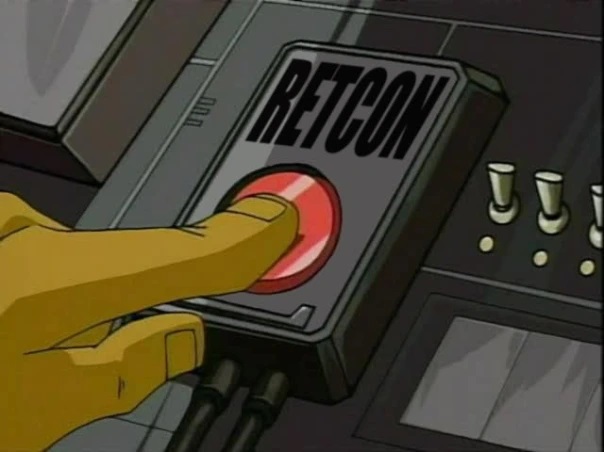Ever-Active Continuity
By Anthony Casperson
9-24-22
Retcons—“retroactive continuities”—have become commonplace in stories from the western world.
Do you not like how this one character died in the story? Retcon it to say that they didn’t really die, or found some new power that lets them live—even though there was no foreshadowing to that event.
Do you not like the direction that the original author took the story? Retcon the whole thing when you get control over the story’s rights and change it to your preferred direction.
Do you want to have a prequel story, but one of the important pieces of this new story stands in contrast to the original’s hints of history? Retcon that history and say that it was because of a faulty narrator. Or just hope that no one catches it.
Do you want to add some theme or ideological statement that’s important to you into an old story which was never meant to have it? Retcon the story to have always included it and make that theme or statement the most important part of the whole thing.
Do you think that this story hasn’t stood well under the changing world and needs to be updated to get with the times? Retcon it and change around whatever pieces you need—no matter how large the alteration—to make it fit with today’s standards.
It almost seems like most storytellers would prefer to change and modify old stories, instead of searching for explanations that allow the older parts of the story stand, while still showing greater intricacies of the larger perspective. (Or, I don’t know, maybe make a new story.)
Because of this retconning desire, I was astounded earlier this week while listening to the podcast called “The Letters Page” that has the creators of the game Sentinels of the Multiverse speak to the imaginary comic books that the tabletop game is “based on.”
During the most recent episode, a fan asked about a story called the “Cosmic Contest” that the creative duo had told in depth before their recent update to the game—called the “Definitive Edition.”
See, the pair have added a few heroes and villains to their game’s new edition. And since the story of “Cosmic Contest” was supposed to include everyone in the imaginary comic book line, there would now be “definitive” absences in the line-up. And so the questioner asked if the creators would have to retcon the story of this gladiatorial game to match the new information.
At first, it seemed that they would fall into the typical retconning shenaniganry that so many others do. Particularly when one of the pair almost immediately agreed to a retcon. However, the other podcast host disagreed. He mentioned how detailed they’d gotten in that storyline. And explained that the whole thing would have to be utterly destroyed if they retconned it. He added that it would be better if they figured out an adjoining storyline that kept those Definitive Edition characters from participating in the Cosmic Contest.
Find an explanation that doesn’t destroy what’s already been shown to be true.
When I heard this denial of taking the retcon option, I was surprised. And a few days later, thought about how this joining of old and new relates to the bible.
Many people seem to want to separate the Old Testament from the New Testament. Such people seem to think that there’s a discrepancy or alteration between the two. (And then try to use this argument to retcon theology to make it agree with today’s standards.)
But one thing that these people forget is that looking at the NT as a divine retcon obliterates the whole story and worth of the OT. And makes it look like the infallible God made a mistake. (The same could be said about trying to retcon theology to today’s standards as well.) Retcons like these utterly destroy any sense of cohesion for history as God designed it.
Plus—and possibly more importantly to the debate about retconning like this—Jesus is very much on the side of allowing the truth of the old to stand while showing a perspective that explains this new information.
In Matt. 5:17, Jesus tells his audience that he hasn’t come to abolish the Law. The word for “abolish” here has the idea of “utterly destroy” or “dismantle.” We get the word “catalyst” from it—a substance that initiates permanent chemical changes, thus making something new from the destruction of the old. This is what Jesus did not come to do.
And what’s not being destroyed? The Law. Shorthand for the words of God from the past, as it relates to his people. We’d call it the Old Testament. That very thing which so many people today want to dismantle and disconnect from the New Testament. Thus, abolishing the same thing that Jesus spoke to preserve, while showing us a grander image that includes it.
Jesus even goes so far as to say—in Matt. 5:18—that not even the tiniest part of the Law will be lost. The world would cease before the word of God does. And then in the next verses, Jesus explains that if any of God’s people relaxes on the strictures of the word of God, they will be the least in the Kingdom. Or will prove their absence from it, because unless we teach the word of God with zeal like a Pharisee (though not like them in any other manner), we will not enter the Kingdom.
Sounds kinda bad to me.
The one that we follow isn’t easing up on the words from the OT, or retconning things to better fit his day and age. No, he shows us—every human throughout the history of the world—how much we need him and his sacrifice to even hope to be a part of the Kingdom. He gives us the explanation of what the OT pointed to.
Without retcon.
Because this has always been the plan from the very beginning. It’s a continuity that has been ever-active—even when we didn’t understand it.
So, let’s not think about the bible as something that was a retcon. Or is in need of one. The world hasn’t passed away. So, the truth of God’s words still stands. Let’s stand with it.




